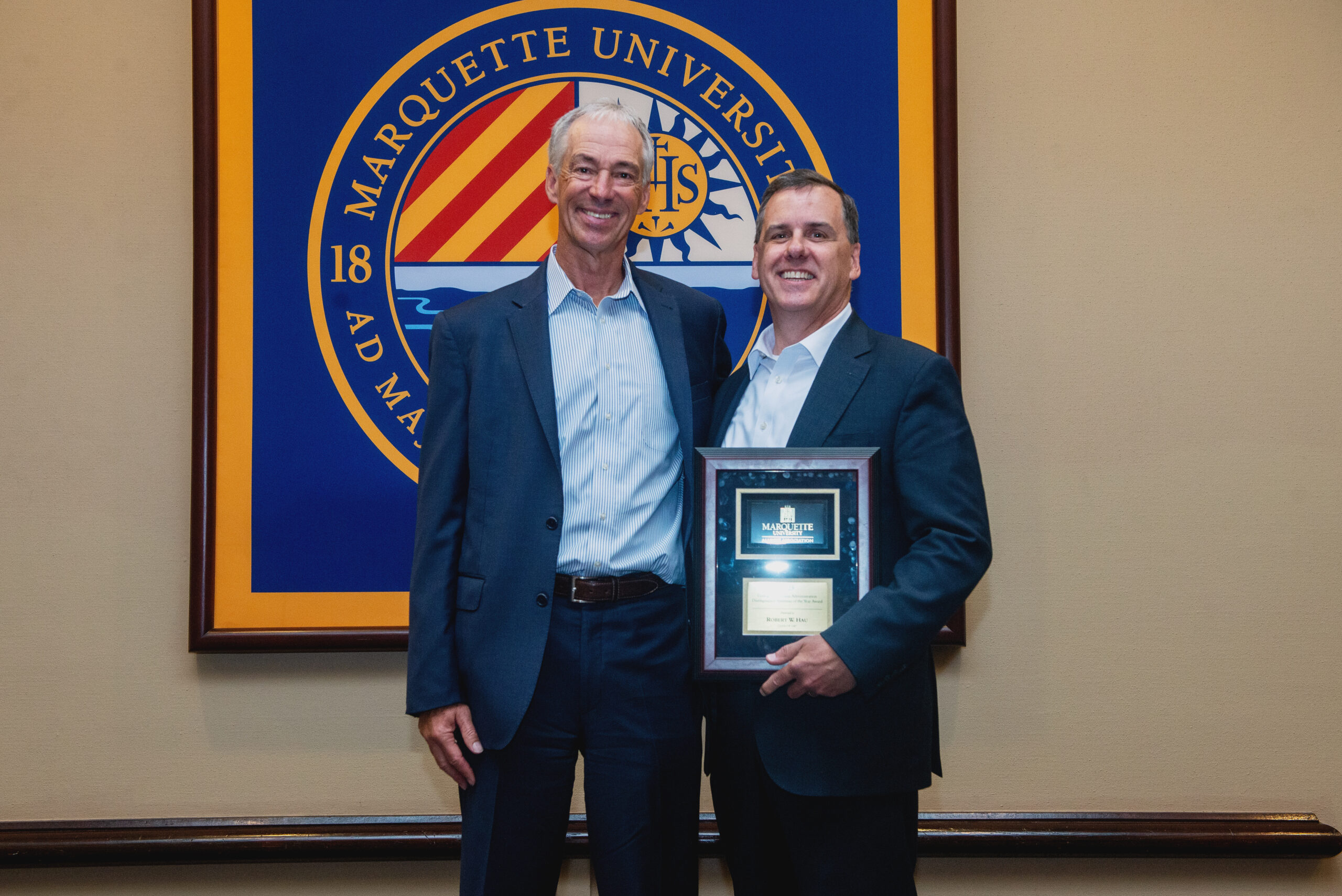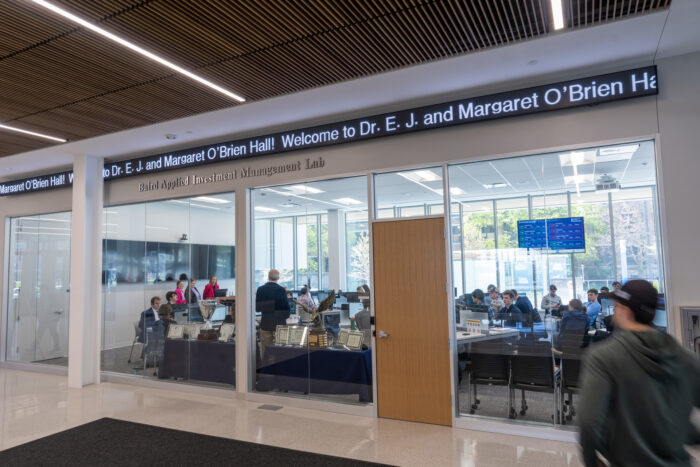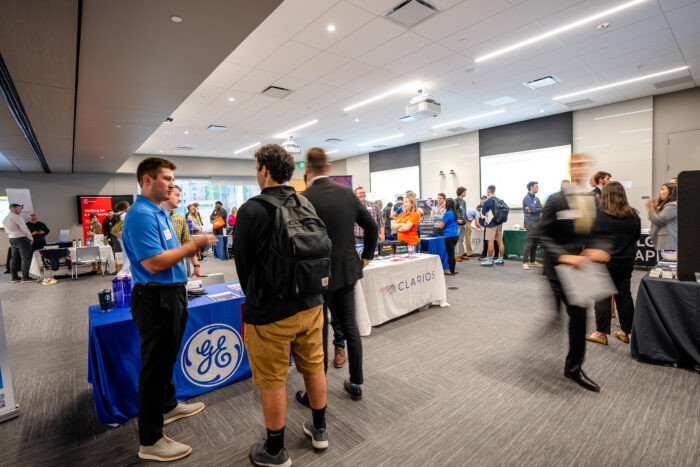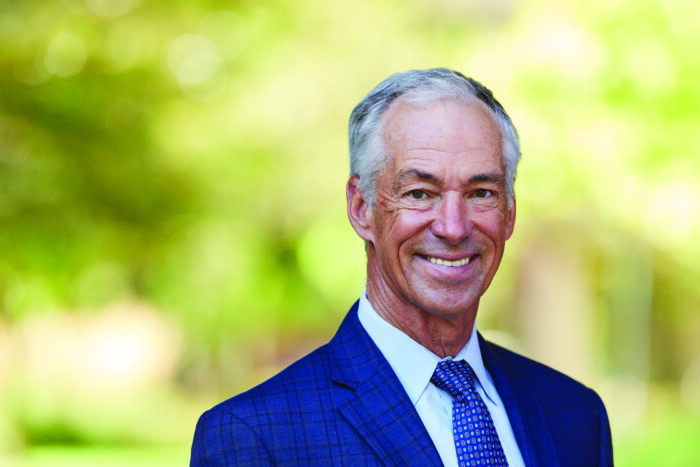From well before dawn to well after dusk, Bob Hau has something to do.
He could be in his office at Fiserv, where he is the chief financial officer, working on the company’s plans to relocate from Brookfield to downtown Milwaukee in 2024. He could be at Marquette, sitting in on a meeting of the President’s Advisory Council. Or he could be attending a kindergarten graduation for the youngest of his eight children.
Hau, a 1987 graduate of the College of Business Administration, has lived Marquette’s values in every facet of life, which is why he won the college’s 2023 Distinguished Alumnus of the Year Award.
Somewhere between those responsibilities, Hau found time to chat about Marquette’s influence on him, Fiserv’s investment in downtown Milwaukee, and how he and his wife became foster parents.
How did you choose Marquette?
I grew up in Chicago and my parents always advocated that we go away for school. We could choose any Illinois state school we wanted or a Catholic university. I had a brother who was 18 months older than me go to Marquette and it felt like home.
How did your Marquette experience shape the person and leader you’d eventually become?
There were a lot of difficulties I had to confront at Marquette, both in my academic and personal life. The place would not give up on me. In my mind, I think there’s a good chance I would not have graduated from college if I had attended another university. Any other place would’ve said, “This kid isn’t going to make it,” but Marquette kept believing in me.
What were some of the difficulties you had to confront?
My wife and I, between junior and senior year, had a baby. We were taking her to a day care center at the courthouse downtown that did not take care of her to a level that we would accept. We pulled her out of day care two weeks into the semester, and I went to my professors to tell them that I was going to miss a few classes to take care of my child, expecting that I’d need to withdraw from some of them.
Every single one of the professors said, “No problem.” One of them even said, “Bring your child to class if you have an issue. We’ll figure it out.” If I had gone to a large state university, I couldn’t imagine that kind of reaction.
What kind of relationship have you had with Marquette in your professional life?
It picked up a little bit when my daughters started going to Marquette, but it really picked up when I moved back to Milwaukee seven years ago and became the CFO of Fiserv. I was now physically here and could be much more engaged.
My wife and I are on the President’s Advisory Council. I’m on the finance department board for the College of Business Administration. I’ll typically do guest lectures several times per year and I have an internship program at Fiserv where we typically look for Marquette students. We have at least half a dozen Marquette students we’ve hired in the last couple of years.
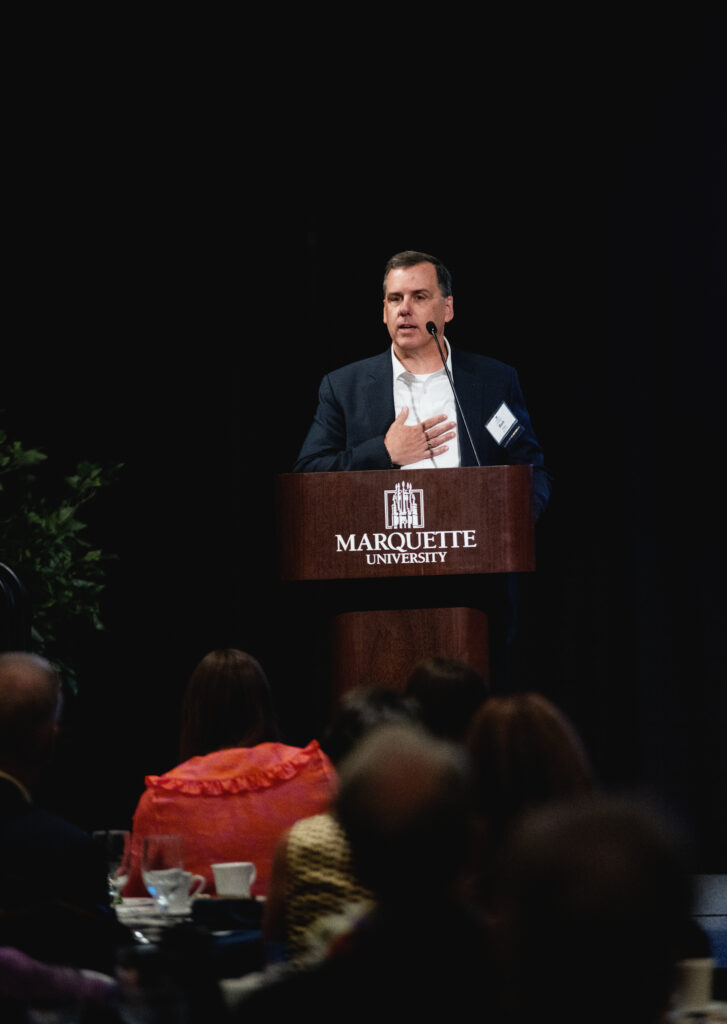
The College of Business Administration just moved into its new home, Dr. E. J. and Margaret O’Brien Hall. Do you see any new opportunities for engagement between Marquette and your peers in the business community because of this building?
Number one, it’s a tremendous building and a wonderful investment from the university into the college. It’s great for recruiting students and I also know that Dean (Tim) Hanley is a huge proponent of community engagement. He works to support and develop relationships between local businesses in an impactful way.
Obviously, it’s a great facility to be used for various events. Fiserv hasn’t participated in that yet, but I know other companies have and I anticipate using it sometime soon. It draws the local community closer to the university, which is a very good thing. The more businesses can physically be in the building for various events, the more we can recruit and develop the relationship between us and Marquette.
You’re spearheading Fiserv’s move to downtown Milwaukee, just blocks away from Marquette’s campus. What was the thinking behind the decision to relocate from the suburbs to the city?
Clearly, there’s significant investment going into downtown Milwaukee and it’s not just Fiserv. Northwestern Mutual and Milwaukee Tool are making those moves, too, and so to be part of that is a significant opportunity. Fiserv is a big proponent of investing in the community, but this is also a place for our folks to come together and work.
We’ve been in Brookfield forever and we either had to do a heavy remodel on our building or move into a new one. We did look at the suburbs, but in order to attract the diversity of employees we want, including millennials and the younger generation, having a downtown office makes sense.
When you hire Marquette students, do you notice any ways in which they are similar to each other?
I think the entire values system of Marquette resonates well, particularly for hiring undergraduates. Most of what people need to learn about Fiserv and the financial technology world, they’re going to learn in our office. Having the values and the well-roundedness of the Marquette education including the ability to solve problems, being agents of change and involvement in the community all match quite well with our needs as a business.
How did you decide to become a foster parent?
My wife and I talked about it when we lived in Philadelphia. Our youngest daughter was 15 years old and would be leaving for college in a few years, but we always found “good reasons” not to do it.
Back in 2014, we went to a Mass where the homily was all around God calling us to use our skills for the greater good. We went to breakfast afterward and my wife said, “You know what I’m good at? I’m good with kids.” She’s a former teacher and raised six daughters. When she heard that homily, she became convinced that we needed to take in children.
We got certified to take in two boys, one of them 7 years old and one of them 16 months old. Within six months, the mother of those two kids had a baby and we were asked to take him in, as well. We went right to the hospital and ended up with three brothers. Eventually, we added a fourth, unrelated boy and they were all reunited with their birth families before we left Philadelphia.
When we moved to Milwaukee, we fostered three boys and eventually adopted two of them with the third moving back to family.
How was the foster experience like raising your biological children and how was it different?
It’s opened my eyes to a whole different world. In foster care, the kids have biological parents to interact with and agencies watching out for them and the court system, and that can get quite complicated. The trauma they faced prior to coming to our home has a real impact on their lives, and helping them through that can be very challenging, emotionally and physically.
But in terms of raising the kids, they come into the house and they’re our children. You don’t treat them any differently. One of my daughters also became a foster parent of a 2-year-old, and I think of it as having a 2-year-old grandchild. He’s not a “foster grandchild”; he’s a grandchild.
Some of the kids we’ve fostered have had very difficult backgrounds. These kids are put into these situations not of their own volition; they’re literally innocent bystanders. Taking them into our home gives them a chance to be kids again and some short respite from the difficulties. Hopefully, their parents or other family members can resolve whatever issue they are having and reunite with the children. In our case, five of the seven children were reunited. We are incredibly blessed to have two of them with us; hopefully, they’ll be part of the Marquette Class of 2038.

